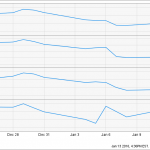TM editors’ note: This article discusses a penny stock and/or microcap. Such stocks are easily manipulated; do your own careful due diligence.
Immunotherapy is intended to train and harness the body’s own immune system in order to recognize and target disease. Many approved immunotherapies are quickly becoming physicians best hope in the battle against cancer. While chemotherapy was once thought to be a breakthrough, immunotherapies have come to the forefront due to the targeted efficacy and less systemic side effects of these powerful medications.
One company pioneering new breakthroughs in cancer immunotherapy is Vaxil Bio Ltd (VXL.V) (VXLLF). Vaxil was founded by Weizmann Institute scientists, one of Israel’s top research universities, in order to provide an altogether novel approach to cancer immunotherapy. The company has diligently advanced its immunotherapy platform and published its research and clinical results in top medical journals. Below is an introduction to Vaxil, its VaxHit™ technology, and ImMucin™, the company’s lead pipeline candidate for hematological malignancies and solid epithelial tumors.
An Introduction To Vaxil Bio
Vaxil is an immunotherapy company developing a pipeline of novel therapeutic vaccines and antibodies for the treatment of cancer. The company’s lead development candidate is ImMucin™, a therapeutic cancer vaccine comprised of the signal peptide domain of the MUC1 tumor-associated antigen (TAA). Vaxil has shown that ImMucin possesses a high density of T- and B-cell epitopes while preserving MUC1 specificity (1). MUC1 (mucin 1) is a cell surface glycoprotein that is highly expressed by carcinomas and hematological tumors, including multiple myeloma (2). Recently, Vaxil has shown that ImMucin can potentially have strong anti-tumor activity when used in combination with checkpoint inhibitors. Additionally, ImMucin represents a new class of neoantigens, with the potential to strongly stimulate the body’s immune system (3).
Vaxil has completed an initial Phase 1/2 clinical trial (n=15) with ImMucin demonstrating the vaccine to be safe and highly tolerable in patients with multiple myeloma (MM). A robust immune response was seen in all patients treated with ImMucin, with the majority of patients achieving stable disease (1). A Phase 2 program is expected to commence in 2017 with ImMucin in a selected population of multiple myeloma patients. ImMucin was granted an Orphan Drug status for use in Multiple Myeloma in the U.S and the EU in 2015
VaxHit™ Platform Technology
ImMucin was discovered using Vaxil’s proprietary VaxHit platform technology. VaxHit combines algorithms which enable in-silicoidentification of signal peptides domains and their subsequent use as immunotherapeutic products. It is essentially a launchpad for unique and specific targeted immunotherapy products. VaxHit provides the ability to identify and select sequences within existing antigens with the potential to elicit a response in T-Cells, including CD4+ helper T-cells and CD8+ Killer T-cells, and in B-cell producing antibodies.

Importantly, during the antigen selection process, Vaxil scientists look for antigens that are highly expressed on tumor cells but less so on healthy cells.. The immune activation by the selected peptide sequence should be robust and impact both cellular and humoral immunity.. The use of signal peptides hold the promise of creating “universal” immunotherapies that target multiple patient populations and are less restricted to certain HLA subtypes.
Target Selection – MUC1
The target antigen for Vaxil’s lead development program, ImMucin, is MUC1. MUC1 is an oncogenic transmembrane glycoprotein in the mucin family found to be overexpressed in a wide variety of hematologic malignancies and solid tumors. For example, it is overexpressed in more than 90% of breast cancers (5) with clear differentiation between normal and malignant cells (6). Work out of Dana-Farber Cancer Institute / Harvard Medical School shows that blocking MUC1 induces death in breast cancer cells in vitro and in xenograft models (7). Implications of MUC1 aberrant expression have also been linked to lung cancers (8) and multiple myeloma (9).
With respect to multiple myeloma (MM), researchers out of Dana-Farber / Harvard demonstrated that MUC1 silencing by CRISPR editing results in downregulation of MYC messenger RNA and protein. The MYC oncoprotein is critical for MM cell and primary tumor survival. Studies further show that MUC1 levels positively correlate with MM progression and in primary cells from over 800 multiple myeloma patients. The findings are published in Blood (May 2016) and collectively provide convincing evidence that MUC1-C drives MYC expression in MM (9).














Leave A Comment